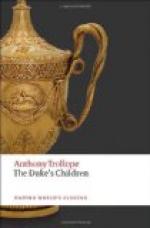That she should be told that she had disgraced herself was terrible to her. That her father should speak of her marriage with this man as an event that was impossible made her very unhappy. That he should talk of pardoning her, as for some great fault, was in itself a misery. But she had not on that account the least idea of giving up her lover. Young as she was, she had her own peculiar theory on that matter, her own code of conduct and honour, from which she did not mean to be driven. Of course she had not expected that her father would yield at the first word. He, no doubt, would wish that she should make a more exalted marriage. She had known that she would have to encounter opposition, though she had not expected to be told that she had disgraced herself. As she sat there she resolved that under no pretence would she give up her lover;—but she was so far abashed that she could not find words to express herself. He, too, had been silent for a few moments before he again asked her for her promise.
‘Will you tell me, Mary, that you will not see him again?’
‘I don’t think I can say that, papa.’
‘Why not?’
’Oh, papa, how can I, when of all people in the world I love him the best.’
It is not without a pang that anyone can be told that she who is of all the dearest has some other one who is to her the dearest. Such pain fathers and mothers have to bear; and though, I think, the arrow is never so blunted but that it leaves something of a wound behind, there is in most cases, if not a perfect salve, still an ample consolation. The mother knows that it is good that her child should love some man better than all the world beside, and that she should be taken away to become a wife and a mother. And the father, when that delight of his eye ceases to assure him that he is her nearest and dearest, though he abandon the treasure of the nearestness and dearestness with a soft melancholy, still knows that it should be. Of course that other ‘him’ is the person she loves the best in the world. Were it not so how evil a thing it would be that she should marry him? Were it not so with reference to some ‘him’, how void would her life be! But now, to the poor Duke the wound had no salve, no consolation. When he was told that this young Tregear was the owner of the girl’s sweet love, was the treasure of her heart, he shrank as though arrows with sharp points were pricking him all over. ’I will not hear of such love,’ he said.
‘What am I to say, papa?’
‘Say that you will obey me.’
Then she sat silent. ’Do you not know that he is not fit to be your husband?’
‘No, papa.’
’Then you cannot have thought much either of your position or of mine.’
‘He is a gentleman, papa.’
’So is my private secretary. There is not a clerk in one of our public offices who does not consider himself to be a gentleman. The curate of the parish is a gentleman, and the medical man who comes here from Bradstock. The word is too vague to carry with it any meaning that ought to be serviceable to you in thinking of such a matter.’




